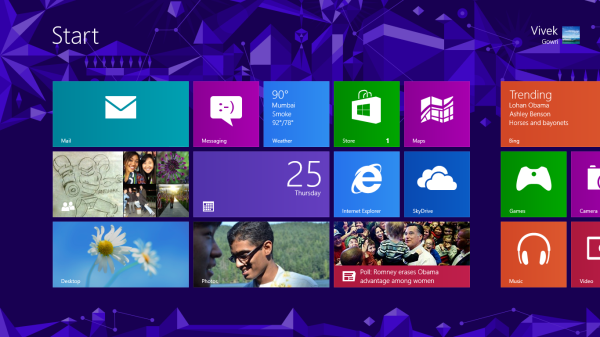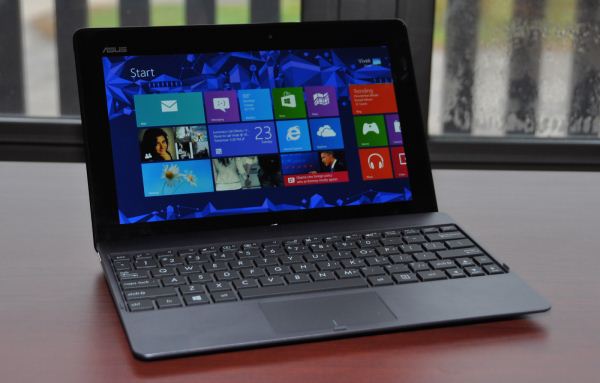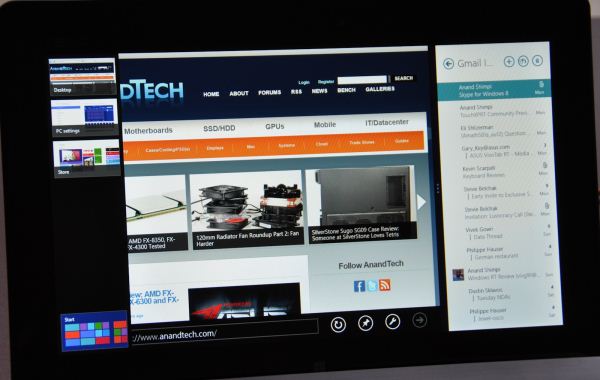The Windows RT Review
by Vivek Gowri & Anand Lal Shimpi on October 25, 2012 12:00 PM EST- Posted in
- Windows RT
- Operating Systems
- Microsoft
- Mobile
- Windows 8
- Tablets
Final Words
So, ten thousand words later, what can we take away from Windows RT? It’s definitely another superb user experience design from Microsoft. Say what you will about Windows Phone 7, but damn if that UI isn’t gorgeous. The Metro design language translates over to the tablet form factor really well, resulting in the Windows Modern UI. We’ve obviously known how Modern UI looks and feels through the various Windows 8 preview builds, but Windows RT ends up being more focused and offering a more consistent experience. It’s a side effect of being limited to apps from the Windows Store - because you spend a significant majority of your time in the new Windows UI, desktop use is minimized. In Windows RT, the Windows Desktop serves the purpose of being the more capable and powerful layer underneath the main portion of the UI, as opposed to Windows 8, which sometimes feels like the new Windows UI existing as an impractical interface layer on top of the traditional desktop.
The dichotomy just feels more comfortable in Windows RT than I feel like it has been in the previous Windows 8 systems that I’ve dealt with. It’s nice. This is the first time I feel like I’ve really connected with the new Windows UI, it makes a ton of sense to me now. I still think for mouse-based navigation, you’re better off treating it as a glorified Start menu, but it’ll be interesting to see how legacy programs affect the use of Modern UI in x86-based Windows 8 tablets as the Windows Store matures.
If you’re really concerned about the state of third-party apps, you just have to wait and see. I’ve seen a lot of snap judgements made about Windows RT in the last couple of days based on the dearth of good applications in Windows Store, and while I agree with that sentiment, I feel like it’s extremely shortsighted to write off the ecosystem already. Neither version of the OS has gone on sale yet, and we know that there are a number of applications that will go live on the official release date, as well as many more coming in the weeks ahead.
This isn’t like Windows Phone, where we need to see whether the platform will get any market traction before predicting the growth of the app marketplace. You can basically assume that the marketplace will expand significantly unless somehow everyone stops buying Windows-based systems on October 26th. The odds of that situation arising seem relatively low, so my bet is that the strength of the ecosystem will be a non-issue a month from now.
The default inclusion of Office 2013 and the emphasis on physical keyboards makes Windows RT the first tablet platform to significantly address the question of productivity. Combined with the equally advanced task switching and multitasking built into the UI, and this becomes the first legitimately useful tablet operating system out there. The Galaxy Note 10.1 wasn’t bad, but it was a single device that built additional functionality into a custom Android skin. Every single Windows RT slate comes out of the box with Office and the ability to have multiple active application windows. It’s just a few steps ahead of competing tablet platforms at this point.
And it’s not like RT loses out on a content consumption front. It’s paired with what is a very strong entertainment store and gaming franchise in Xbox Live, and the browsing experience is definitely competitive. It’s also a competent e-reader, with Amazon’s Kindle being one of the headlining apps currently in Windows Store. It even matches the power efficiency of the other ARM-based tablets, with competitive battery life and standby time. Obviously, ARM is the driving factor in the low power consumption, but it’s good to see that Windows is on a similar level as iOS and Android.
So this is a tablet platform that can do a good job of replacing both an iPad and an ultraportable in a number of different workflows. You get the best of both worlds, in some sense - Windows RT tablets have similar form factors to the iPad and leading Android tablets, and offer near-equal battery life, performance, and user experience, but they also give you the added benefit of strong productivity applications and the power of Windows Desktop. From a conceptual standpoint, almost anything you can do with an iPad can be done equally well (or close) on a Windows RT tablet, but the desktop-caliber office suite and versatile multitasking interface of Windows RT are impossible experiences to replicate on the iPad. It's not a perfect operating system by any means, but it brings a new dimension to the tablet space. So if you’re looking for a new tablet this fall, Windows RT deserves your consideration.













233 Comments
View All Comments
faizoff - Thursday, October 25, 2012 - link
I just got done fully reading the Surface review. This should be a good one as well.EnzoFX - Thursday, October 25, 2012 - link
Sure was.Win RT is promising, it really is all about the tablet experience. Which is why I don't understand their decision to have the desktop and access to all the underpinnings. Surely a real power user won't limit themseles to RT, and simply go for the 8?
Is it to have developers make desktop-centric arm based apps? That seems counter intuitive. They could have easily made Office into a Modern UI style app. What is the real point in the end? Maybe I missed something.
My only other criticism is little things that sometimes show me lack of focus. 4 edge swipes? Couldn't they have streamlined that down to 2 max? and why must some things just be too hidden, or even not even accessible via the Modern UI?
Leonick - Thursday, October 25, 2012 - link
"Is it to have developers make desktop-centric arm based apps? That seems counter intuitive. They could have easily made Office into a Modern UI style app. What is the real point in the end? Maybe I missed something."Considering developers can't make desktop apps for Windows RT that isnt it...
I'm guessing MS was simply too lazy or "didn't have time" to build a metro equivalent for everything for Windows 8 and will likely continue the work for the next release, as long as the desktop is still there they could also put Office even on RT with minimal effort.
But yea, it's odd.
blanarahul - Thursday, October 25, 2012 - link
I am really interested in seeing Windows RT with Quad Core Qualcomm S4 Pro. 40% faster CPU, 100% faster GPU than Tegra 3. Power friendly. It should make RT shine even more. In fact I believe that the APQ8064 was made for Windows RT.karasaj - Friday, October 26, 2012 - link
This is exactly what I was thinking and hoping Surface would have come out with.Krysto - Thursday, October 25, 2012 - link
"The odds of that situation arising seem relatively low, so my bet is that the strength of the ecosystem will be a non-issue a month from now."Really? A month from now? Can I hold you to that? It will be at least a year before Metro store gets even tens of thousands of apps. I think you've been reading too many Microsoft PR statements ready, and it's starting to influence your objectivity, and now you're just using Microsoft's words as your own - while thinking to yourself that they are your own words.
StevoLincolnite - Thursday, October 25, 2012 - link
Right... Because you're really going to browse and install 10's of thousands of Apps. (With the majority being fart of flashlight apps anyway.)munsie - Thursday, October 25, 2012 - link
So when it was Windows vs Macs back in the 90s, the argument was always that there were more apps on Windows, why would you buy anything else? But now that there are more iOS apps vs Win RT apps, it's that most of them are "fart of flashflight apps"?More apps isn't just more junky apps -- it means that more experimentation/innovation is happening as well. It means that there are apps being built for the long tail, not just the mass market appeal. Think about apps targeting very specific users, like doctors, lawyers, engineers, etc. These apps aren't the ones you see at the top of the charts, but are the ones that sell platforms.
Microsoft more than any other company should understand what Apple has accomplished with the iOS App Store.
andrewaggb - Thursday, October 25, 2012 - link
Yes and no though. Developer tools are much better than they were in the 90's.Many of these apps are already cross platform with ios and andriod, and many others already have windows versions or silverlight/wp8/xbox 360 versions that can be ported much easier.
Many of the popular dev tools used by smaller/indie developers already support exporting to different platforms, so if they don't support windows 8 yet, they will soon enough.
Plus Visual Studio is great.
Not to say Apple's accomplishments aren't amazing, they are. Nobody could have envisioned the success they've had in such a short time.
Apps will come. There's no money to be made right now anyways, nobody has devices, it'll all sort itself out in a few months. I think 1 month is optimistic, but within 6 months the apps will be there.
StormyParis - Thursday, October 25, 2012 - link
Well, the 90's argument was "1- why pay more 2- for slower, less expandable hardware that 3- is missing some key apps or even whole categories of apps and 4- is fading", so really, a series of issues.In the present case we get , 1- why pay the same or less 2- for slower, but a lot more expendable hardware that 3- has a killer app, though it's missing many key apps and all of the non-key ones but 4- will probably surge.
BTW... Google "75% Of Apple's App Store Is Ignored by Consumers" for a fun fact, if it is indeed true.